Intel X25-V in RAID-0: Faster than X25-M G2 for $250?
by Anand Lal Shimpi on March 29, 2010 8:59 PM ESTOverall System Performance using PCMark Vantage
Next up is PCMark Vantage, another system-wide performance suite. For those of you who aren’t familiar with PCMark Vantage, it ends up being the most real-world-like hard drive test I can come up with. It runs things like application launches, file searches, web browsing, contacts searching, video playback, photo editing and other completely mundane but real-world tasks. I’ve described the benchmark in great detail before but if you’d like to read up on what it does in particular, take a look at Futuremark’s whitepaper on the benchmark; it’s not perfect, but it’s good enough to be a member of a comprehensive storage benchmark suite. Any performance impacts here would most likely be reflected in the real world.
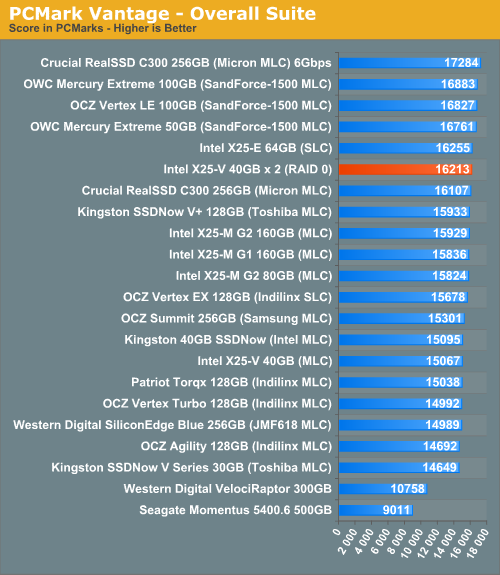
Intel had been falling behind in the PCMark Vantage charts thanks to the SandForce and Crucial drives, but RAIDing these two X25-Vs makes up for a lot of lost time. Overall performance is basically on par with the entry level SandForce drives, but behind the C300 on a 6Gbps controller. The rest of the tests have the X25-V landing either in the middle or near the top of the charts, not bad for $250.
The memories suite includes a test involving importing pictures into Windows Photo Gallery and editing them, a fairly benign task that easily falls into the category of being very influenced by disk performance.
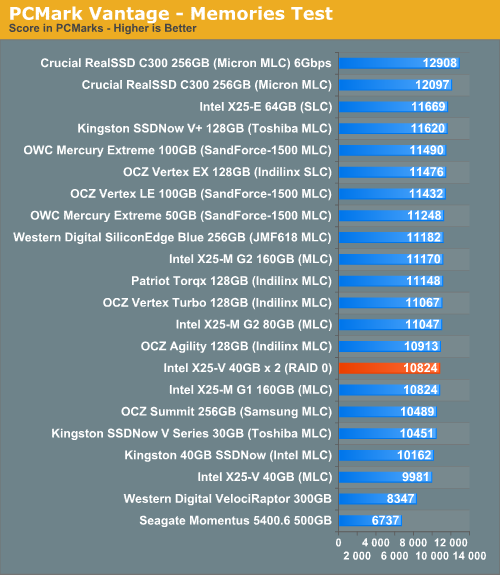
The TV and Movies tests focus on on video transcoding which is mostly CPU bound, but one of the tests involves Windows Media Center which tends to be disk bound.
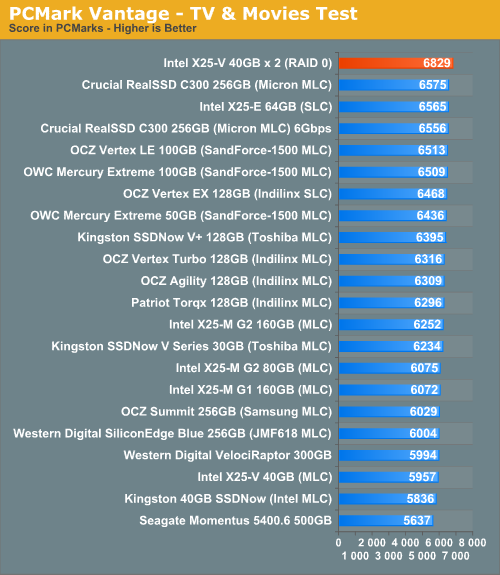
The gaming tests are very well suited to SSDs since they spend a good portion of their time focusing on reading textures and loading level data. All of the SSDs dominate here, but as you'll see later on in my gaming tests the benefits of an SSD really vary depending on the game. Take these results as a best case scenario of what can happen, not the norm.
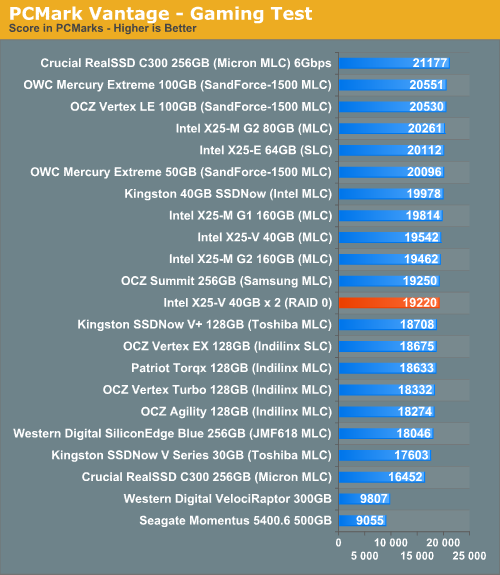
In the Music suite the main test is a multitasking scenario: the test simulates surfing the web in IE7, transcoding an audio file and adding music to Windows Media Player (the most disk intensive portion of the test).
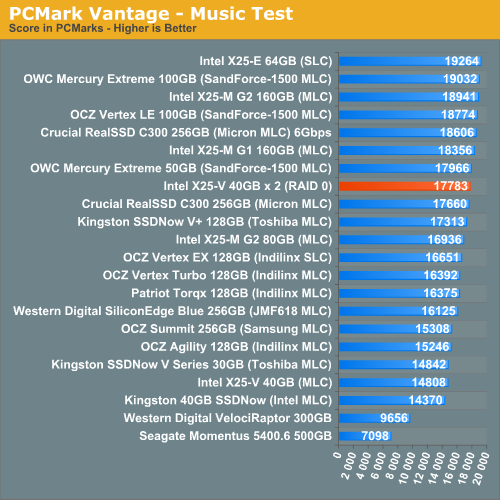
The Communications suite is made up of two tests, both involving light multitasking. The first test simulates data encryption/decryption while running message rules in Windows Mail. The second test simulates web surfing (including opening/closing tabs) in IE7, data decryption and running Windows Defender.
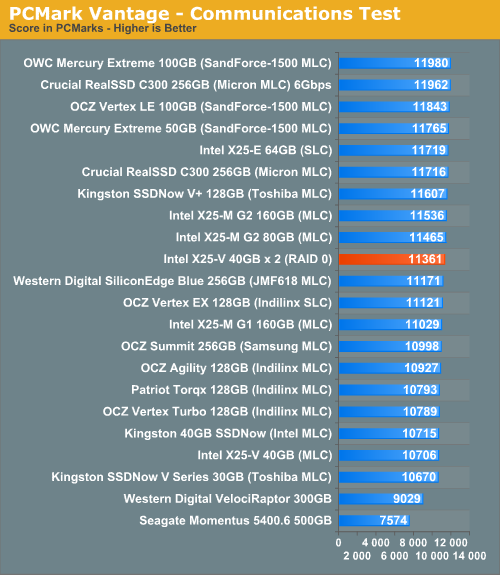
I love PCMark's Productivity test; in this test there are four tasks going on at once, searching through Windows contacts, searching through Windows Mail, browsing multiple webpages in IE7 and loading applications. This is as real world of a scenario as you get and it happens to be representative of one of the most frustrating HDD usage models - trying to do multiple things at once. There's nothing more annoying than trying to launch a simple application while you're doing other things in the background and have the load take forever.
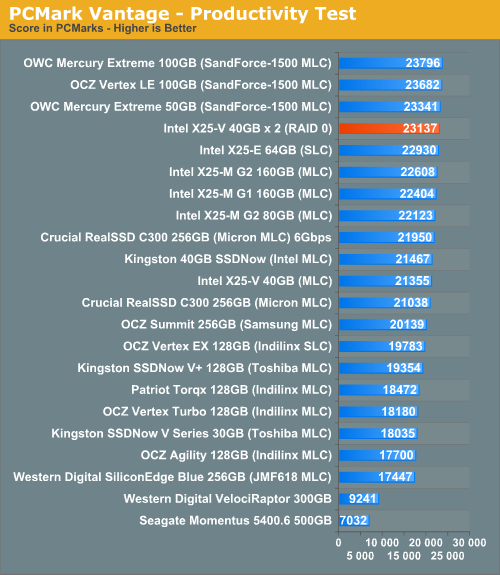
The final PCMark Vantage suite is HDD specific and this is where you'll see the biggest differences between the drives:
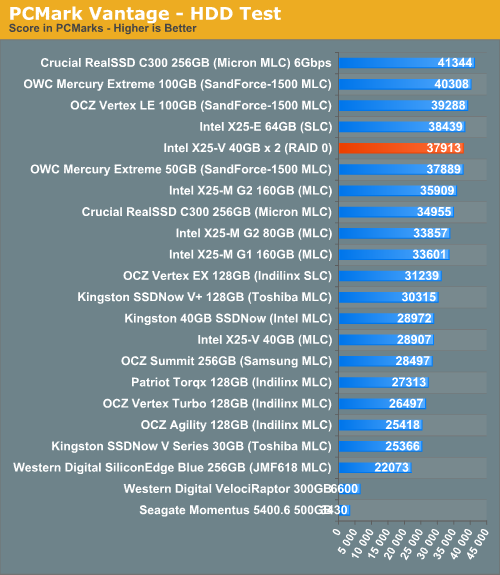










87 Comments
View All Comments
IvanAndreevich - Tuesday, March 30, 2010 - link
I am sure they would blow these away, and at $80 AR they are cheaper per GB. They also support GC and TRIM with 1.5 firmware.machzero - Tuesday, March 30, 2010 - link
Ya missed an important point on the first page."1) There is currently no way to pass the TRIM instruction to a drive that is a member of a RAID array."
The drives may support TRIM but no RAID controller on the market will pass the instruction to the drive.
Minion4Hire - Tuesday, March 30, 2010 - link
And OCZ's garbage collection is entirely independent from the drive controller, and doesn't need instructions passed to it like TRIM. It will work regardless of your configuration.And on that note, I have two 60GB OCZ Agility SSDs in RAID 0 and am very happy with them. My sequential read performance sits at over 400MB/s and sequential writes are over 200MB/s. Although my random read and write performance isn't quite as nice as the Intels RAIDed here, I didn't pay any more for my drives ($140 ea. Canadian on sale after rebate) and have an extra 40GBs of storage over this Intel RAID. The extra capacity is what sold me on the OCZ drives over Intel, but I'd be willing to bet that the Intel X25-V drives would offer a better overall RAID experience than a set of Agilities, even with their lack of garbage collection as Anand noted.
funkyd99 - Wednesday, March 31, 2010 - link
Is the lack of TRIM a limitation of RAID controllers or a limitation in the drivers? I.e. could an update to the Intel storage drivers remedy the problem on Intel chipsets?plamengv - Friday, April 2, 2010 - link
There is no lack of TRIM for RAIDs anymore thanks to Intel.http://guru3d.com/news/intel-brings-trim-to-ssds-i...
nwrigley - Friday, April 2, 2010 - link
Nope, it only supports single drives running next to a RAID. RAID still lacks TRIM support.http://techreport.com/discussions.x/18653
Makaveli - Tuesday, March 30, 2010 - link
Performance is great, since I already have one 160GB G2 drive I would love to see a second in Raid 0..hint hint :)should be able to hit 200 mb/sec writes!!
TheHolyLancer - Tuesday, March 30, 2010 - link
I'm wondering, is there a way (be it a special raid card or something else) to allow me to to put put a raid 0 +1 array in there with standard hdds?Something like 2 SSDs + 2 hdds or hell 2 SSDs + 1 large hdd with 2 partitions. This way, you can get data protection on the cheap.
Or for something like this to work, the drive performance has to be big, or else you need a huge data cache on the controller in order for the hdds to catch up to SSDs.
Or is this just completely outside the scope of what current controllers can do?
Calin - Tuesday, March 30, 2010 - link
You don't have that option (and anyway, it will slow your RAID to the speed of the slowest writing disk, even if reads will always take place from the SSD drives).therealnickdanger - Tuesday, March 30, 2010 - link
You're better off creating a SSD RAID-0 as your boot/app/game drive and then back up that partition every night (or twice per day?) to a HDD RAID-1/5/6. It's not as protected as a real-time RAID-1/5/6, but it's the best and cheapest of both worlds. Also, if you've ever tried to restore a RAID-1/5/6, it takes much, MUCH longer than restoring a partition from a backup. I use Windows Home Server to do this for my ~60GB SSD partition and it is bloody quick (the one time I had to do it).